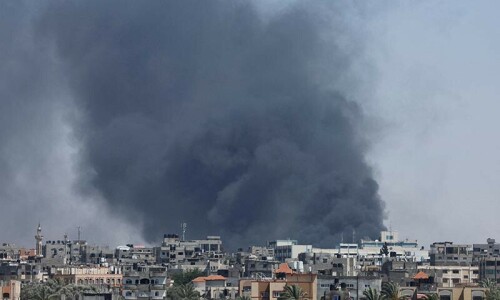WASHINGTON, Sept 5: The White House has released a report featuring a new strategy for combating terrorism that focuses more on decentralised networks of extremists than on Al Qaeda, and singles out Iran as a potential source of unconventional weapons for terrorist groups.
The new strategy also acknowledges that while the US succeeded in undermining global terrorism after 9/11, the enemy has adjusted to US defences.
The report says the enemy the US faces today is not the same faced on September 11; they have modified their ways of doing business. “America is safer, but not yet safe,” it warns.
The strategy was first drafted in 2003, updated in March and published on Tuesday after major modifications.
Despite President Bush’s claim that Iraq has become the ‘central front’ of the US-led war on terror, the new strategy focuses less on Iraq and more on the new breed of small terror groups springing up around the world.
The White House acknowledges that “the ongoing fight for freedom in Iraq has been twisted by terrorist propaganda as a rallying cry.”
The strategy singles out Iran as “the most active state sponsor of terrorism”, indicating that the Bush administration plans to keep on its pressure on Iran on nuclear and other issues.
It also envisages forcing Iran and Syria to stop supporting Hezbollah in Lebanon, which has earned many admirers in the Arab world after bravely fighting back Israeli soldiers during the recent crisis.
A significant portion of the White House report is devoted to describing the changed nature of the terrorist threat since 2001.
“The United States and our partners continue to pursue a significantly degraded but still dangerous Al Qaeda network,” the reports says, adding: “Today, the principal terrorist enemy confronting the United States is a transnational movement of extremist organisations, networks and individuals.”
“Terrorist networks today are more dispersed and less centralised. They are more reliant on smaller cells inspired by a common ideology and less directed by a central command structure.
“While the United States government and its partners have thwarted many attacks, we have not been able to prevent them all. Terrorists have struck in many places throughout the world, from Bali to Beslan to Baghdad.
“While we have substantially improved our air, land, sea and border security, our homeland is not immune from attack.”











































Dear visitor, the comments section is undergoing an overhaul and will return soon.